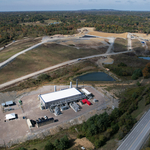(Bloomberg)
Key Takeaways
- The deficit for this fiscal year is slightly lower than what was expected in the March budget, coming in at C$40 billion instead of C$40.1 billion. But projected shortfalls for the next four fiscal years are all higher. While a C$14 billion gap was projected for 2027-2028, now it’s expected to be C$23.8 billion, falling to C$18.4 billion the following fiscal year.
- Freeland said in the document her government’s fiscal anchor is “reducing federal debt as a share of the economy over the medium term,” which she argued will preserve Canada’s AAA credit rating. The debt-to-gross domestic product ratio is, however, is forecast to rise to 42.7% next fiscal year before falling to 39.1% in 2028-2029.
- The government plans to issue C$71 billion more in bonds and treasury bills than it had originally projected in its March budget.
- It announced several new measures to boost housing supply in coming years. Starting in 2025- 2026, it will provide an additional C$1 billion over three years to build more than 7,000 new affordable homes.
- Also starting in 2025-2026, it will provide an extra C$15 billion in new funding for the construction of more than 30,000 new rental homes across Canada.
- It announced a new Canadian mortgage charter, which sets out expectations for how financial institutions are to work with Canadians to provide tailored relief and ensure payments are reasonable for borrowers.
- The government said the Canada Growth Fund will be the main federal entity issuing carbon contracts for difference, which backstop the future price of carbon to provide certainty for businesses. The fund will allocate up to C$7 billion of its current C$15 billion in capital on these agreements, and it is already negotiating with a number of project proponents.
- It provided a timeline for previously announced clean investment tax credits, promising to introduce legislation this fall on tax credits for carbon capture, utilization and storage as well as for clean technology.
- The government also said it will explore removing the “30% rule,” which restricts Canadian pension funds from holding more than 30% of the voting shares of most corporations. It said the move will help pension funds to more fully participate in Canada’s economic growth.
- An Indigenous loan guarantee program will be developed to help facilitate Indigenous equity ownership in major natural resources projects, with next steps announced in the 2024 budget.
Share This:
Next Article




